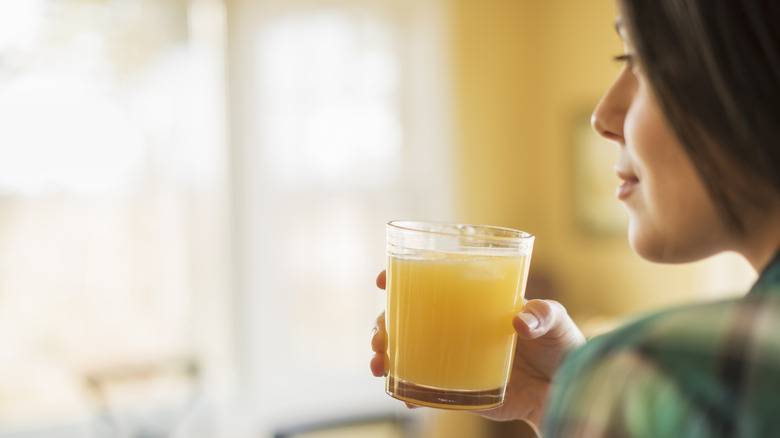Here's How Long Orange Juice Should Stay Good After Opening
The story of how orange juice became such a massive breakfast staple is pretty fascinating, and the short version is that it happened because a whole lot of people bought into some serious marketing. Starting during a bumper orange crop harvested in 1909 and with a marketing push through the 1920s, orange growers touted their juice as a delicious and vitamin-filled way to start the day. Add in claims that it could cure a condition called "acidosis" — spoiler alert: it can't — and orange juice was on everyone's tables.
But here's a question: How long does it actually last? The answer isn't exactly straightforward, and it depends on a few things — including what kind of orange juice you have. Your time frame varies between a few hours to 10 days. But we'll talk about that in a moment.
It's worth mentioning, though, that the best way of telling that any food is past its prime is to look for signs of spoilage. In orange juice, that will be things like an off odor, a change in color — particularly if it seems like it's turning brown — or the presence of floating particles. If none of those are apparent, but it still tastes a little too sour when you take a sip, it's best to err on the side of caution and get rid of it. Bad orange juice is nothing to take risks with and can contain mold and bacteria that can result in serious illness.
How long your orange juice will last depends on a few things
While there are some foods that don't need an expiration date, orange juice isn't one of them; you should definitely keep an eye on whether or not it's getting close to the end of its shelf life before drinking it. When orange juice is properly refrigerated — and if you're wondering what temperature you should have your fridge at, that's below 40 degrees Fahrenheit — a good guideline is that it'll probably be fine for somewhere between five and seven days. That's not always the case, though.
Indeed, you're not precisely "opening" freshly-squeezed orange juice, but it's worth mentioning that without the preservatives and additives found in commercial brands, it will only last three days in the fridge at the most. If it sits out at room temperature, that drops to around just two hours.
It's entirely possible that some boxed, bottled, and canned orange juices can last for up to 10 days in the fridge, but orange juice made from a can of concentrate shouldn't be left in the fridge for more than a week. Those variables are why it's so important to be familiar with the signs that your juice is turning. Remember, too, that every day it sits, it will start getting less and less tasty. Bottom line? Use it as soon as possible.
Yes, you can freeze orange juice to prolong shelf life
If you can't drink a carton of orange juice before it starts to turn, we have some good news: There are plenty of ways to use orange juice. It's great when used in a marinade or a barbecue sauce, and if you love soaking some overnight oats for breakfast or making a morning smoothie, it's pretty delicious here, too. Orange juice is also the surprising secret to amping up your white rice, and if you pair that with a copycat Panda Express orange chicken, you might just have a new family favorite.
You can also freeze orange juice, but there is, however, a caveat. When orange juice comes out of the freezer, it won't be nearly as fresh and delicious as it was when it went in. You'll likely see changes in color and consistency, but while you might not want to drink a glass of thawed orange juice, there are still some brilliant uses for it.
Opt for freezing your orange juice in ice cube trays, and when they're frozen, transfer them to an airtight container or freezer bag. They'll keep for months, and you can use those ice cubes in a smoothie without noticing any changes from the freezing process. They're also great for using in any cocktails that you want chilled but not watered down. Add them to a mimosa or a screwdriver for a delicious, refreshing cocktail that's sure to please.


